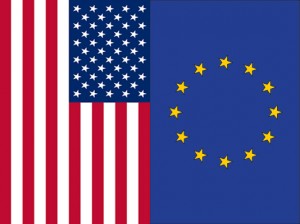 Europolitics.org reports that the U.S.-EU High Level Working Group (HLWG) on Jobs and Growth, co-chaired by Europe’s Trade Commissioner Karel De Gucht and US Trade Representative Ron Kirk , will likely release a report proposing the negotiation of a “comprehensive and ambitious free trade agreement (FTA)” by the end of the month. The draft report reviews three options for increasing trade between the United States and the European Union, and favors the option of a comprehensive trade agreement.
Europolitics.org reports that the U.S.-EU High Level Working Group (HLWG) on Jobs and Growth, co-chaired by Europe’s Trade Commissioner Karel De Gucht and US Trade Representative Ron Kirk , will likely release a report proposing the negotiation of a “comprehensive and ambitious free trade agreement (FTA)” by the end of the month. The draft report reviews three options for increasing trade between the United States and the European Union, and favors the option of a comprehensive trade agreement.
More specifically:
The draft 50-page report seen by Europolitics studies several options regarding the potential opening of FTA negotiations with the US – option A: no policy change at all; option B: tariff, services or procurement only agreements; and option C: a comprehensive trade deal. “There is a clear-cut case for the EU to enter into negotiations for a comprehensive and ambitious FTA as the preferred option,” the report concludes.
The High Level Working Group was formed in November 2011, “to identify policies and measures to increase U.S-EU trade and investment to support mutually beneficial job creation, economic growth, and international competitiveness.”
In June 2012, the HLWG produced an interim report that discussed the possibility of a trade agreement. Accoring to the interim report, the parties “reached the preliminary conclusion that a comprehensive agreement that addresses a broad range of bilateral trade and investment policies as well as issues of common concern with respect to third countries would, if achievable, provide the most significant benefit of the various options we have considered.” However, it also said that “Both sides agree that it would not be feasible in negotiations to seek to reconcile across the board differences in the IPR obligations that each typically includes in its comprehensive trade agreements.”
Nonetheless, when the HLWG solicited stakeholder input on the more narrow issue of regulatory coherence; and it received industry input asking for a more comprehensive agreement. All of the comments are available on the HLWG page. Examples pertaining to intellectual property are below:
National Association of Manufacturers (Submission)
The NAM supports the launching of formal trade agreement negotiations between the United States and the EU and supports the negotiation of an agreement that achieves the following objectives:… Provides stronger protections for innovations and intellectual property, including identifying new ways to cooperate in effectively addressing illicit trade, piracy and counterfeiting.
Joint comment by the Pharmaceutical manufacturers and Research Association, and the European Federation of Pharmaceutical Industries and Associations (Submission)
It remains our strong position, however, that any negotiations between the U.S. and the EU to enhance the trade relationship between these regions should be comprehensive and ambitious, addressing not only regulatory compatibility initiatives, but also intellectual property protections, market access provisions, and customs, tariffs and public procurement measures.
National Foreign Trade Council (Submission)
NFTC and its members urge the governments of the U.S. and EU, through its current U.S.-EU High Level Working Group on Jobs and Growth, to move without delay to initiate negotiations toward a comprehensive agreement or set of agreements covering the full range of issues including goods, services, and agriculture, tariff and non-tariff technical barriers to trade, competition, investment, intellectual property, trade facilitation, customs, rules of origin, and the range of new “21st century issues” now included in the only current U.S. trade and investment negotiation, the trans-pacific economic partnership (TPP).
On the other hand a joint comment by the European Generic Medicines Association and the the (US) Generic Pharmaceutical Association recomends keeping IP out of the trade agreement (Submission)
…it will be more constructive to keep intellectual property / data protection rights out of the scope of this exercise. For this reason we recommend to not attempt to create harmonisation in this area but to recognise the different approaches, as the intentions and history behind them are different.
Finally, comments submitted by the European Telecommunication Network Operators asked that the FTA protect flexibility and openness for users (Submission)
Commercial Flexibility should be added to the principle of Openness: On account of the new competitive scenario for the provision of ICT services the EU and the US should not only promote the ability of consumers to legitimately access and distribute information and run applications and services of their choice, but also ensure the ability of connectivity suppliers to manage their networks, develop new business models and supply services, including convergent and multiple-play services, on a cross-border, technology neutral basis. This dynamic commercial environment is necessary to allow new business models that are able to support the next level of investment in infrastructure.




